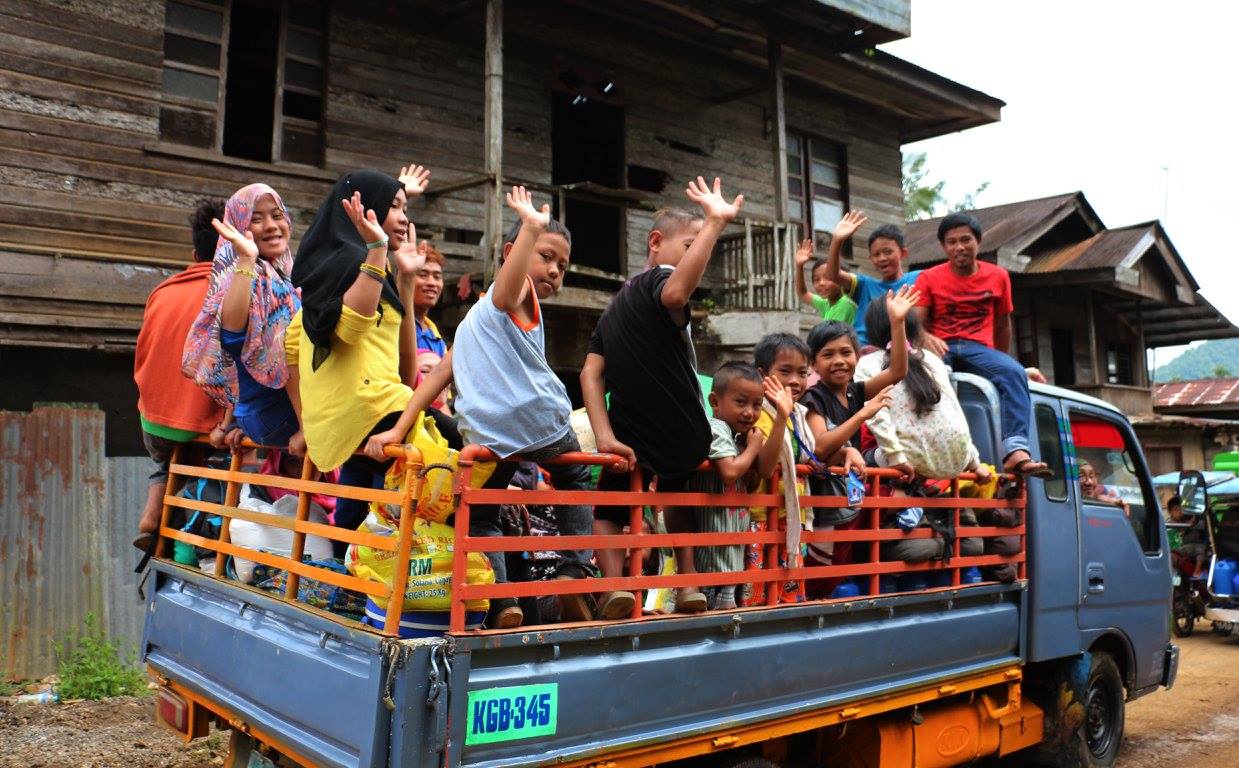
Hope for lasting peace and safety: IDPs begin return to Marawi
The gunfire has fallen silent in Marawi City since the military declared the end of the conflict in October. The hope of returning home has rekindled for over 350,000 internally displaced persons who sought refuge with host families and in evacuation centres for the last five months. Thousands of people returning to their barangays are finding out what is left of their properties and homes. The Government of the Philippines has started the phased return of Marawi City residents whose homes had minimum to medium damage. As of 10 December, the Government has facilitated the return of over 26,000 families following clearing operations by the military for unexploded ordnance and debris. The UN migration agency, IOM is assisting authorities with facilitating the safe and dignified return of the displaced to their places of origin. People from about one third of barangays affected by heavy fighting and destructions during the conflict may not be able to return soon. An estimated 9,500 families are from 24 barangays completely destroyed by the conflict.
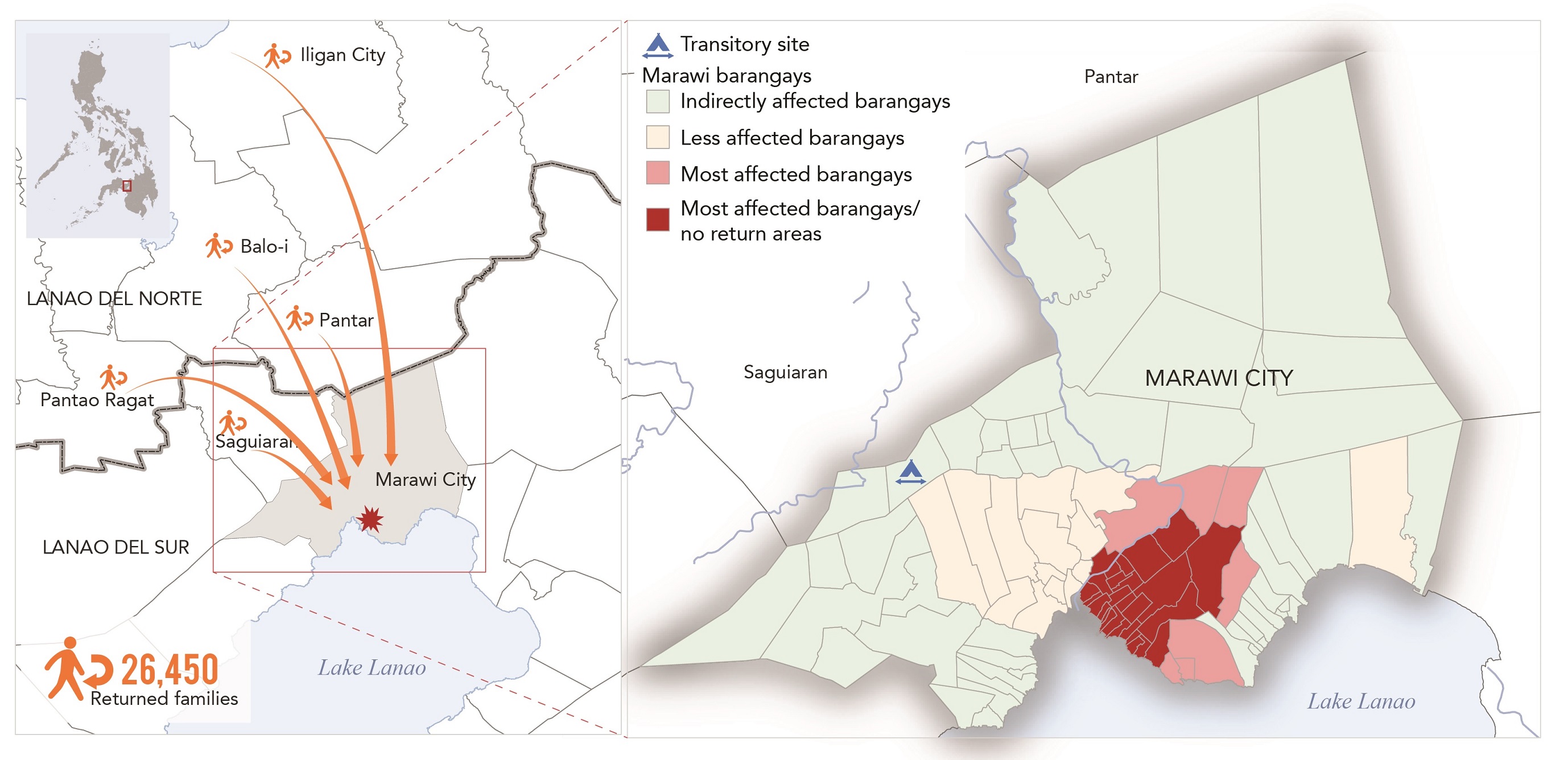
Marawi Return Areas Snapshot (Source: LGU Marawi City, PSA)
As of early December, some shops in Basak Malutlut, Datu Saber, Poona and Amito Marantao barangays have opened for business. Fabrication of bricks for housing by private companies is picking up. The most affected areas are envisioned to be transformed to become the modern business area in the city, with support from the private sector. However, issues on land ownership need clarification in the rehabilitation and rebuilding of Marawi.
Challenges of returning home
Many of those who initially returned to Marawi have subsequently gone back to evacuation centres and host communities due to the delays in restoration of utilities, services, schools and livelihood opportunities.
Local markets are slowly returning, but restoring the food supply chain is one of the most immediate rehabilitation requirements and is crucial to complete the transition from emergency to recovery. Both returnees and displaced communities will need continued support to address their basic food and nutrition needs. The Food and Agriculture Organization of the United Nations is focusing on the emergency delivery of rice, corn seeds and fertilizer to enable returning farming families to catch the year-end planting season. IDPs are also being provided with vegetable production and boiler chicken production packages to help augment incomes and food supply.
Continuing needs of displaced children
Over 31,000 learners were displaced by the Marawi conflict. As the fighting has destroyed schoolrooms and are not ready to reopen, displaced parents who enrolled their children in Iligan or neighboring schools are keeping them enrolled through the remainder of the school year to finish their studies. Education interventions including psychological first aid for learners is still needed in host communities and evacuation centres. There is also a need to provide information on the status and availability of early learning services for displaced families.
Displaced children are also vulnerable to exploitation and violence, and there are reports of children being recruited into armed groups. Psychosocial interventions must be urgently scaled to reach children, and identify vulnerable ones and provide referral services, including alternate care.
Validation of residents of Marawi
The local government at barangay level is faced with the challenges of identifying the actual residents of their barangays. Some of these local governments do not have an updated list of their residents. A validation and house mapping exercise of the residents is a challenge because some of the residents have no proof of ownership and relevant documents. Around 40 per cent of IDPs have no knowledge of or access to a grievance mechanism to air their concerns on displacement (UNHCR Snapshot, November 2017).
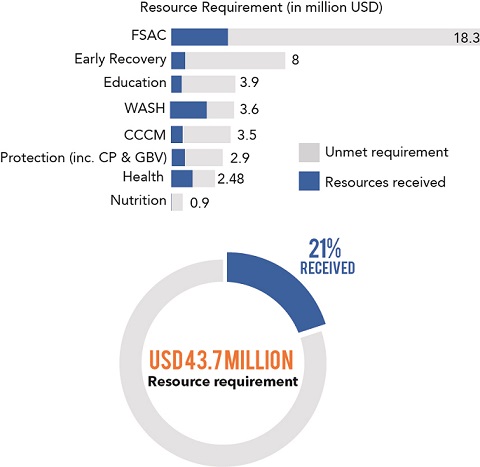
Credit: OCHA
Remaining displaced need continued humanitarian assistance
Displacement to host communities and evacuation centres has become prolonged and difficult. There are reports that the distribution of food has become irregular. Mobile health services to evacuation centres and home-based IDPs are ending in December 2017 due to lack of funding. There are also reports of unequal distribution of assistance, with some home-based IDPs not receiving food and other humanitarian assistance. The feeling of exclusion is building up among IDPs. Construction of permanent shelters for IDPs is progressing slowly. Aid agencies in support of the Government continue to address these needs but with dwindling resources and finances.
A significant number of the 353,000 people displaced by the conflict will continue to rely on humanitarian assistance for the first quarter of 2018 and beyond. After conducting additional sectoral assessments, including food security, child protection and return intentions, the humanitarian community will require US$43.7 million to continue targeted assistance for the first half of 2018. The frustration of not able to return soon to their homes and property is running high. Fear of recruitment of the youth into armed groups is a worry for the elders. Results of a child protection rapid assessment suggest that twenty nine percent of assessed communities report young girls are joining armed groups as a mitigation measure.
Repeated displacement of Butig and Piagapo communities
There is a continuing need to assist the population of Butig and Piagapo affected by fighting even before Marawi conflict. In 2016, the population were displaced by bombing raids targeted at the Maute rebel groups. They fled to the homes of relatives in Marawi City and nearby municipalities. The Marawi incident has doubly displaced them, making them one of the most vulnerable population in Lanao del Sur province.
The UN is focusing on the emergency delivery of rice, corn seeds and fertilizer to enable returning farming families to catch the year-end planting season.
The Marawi incident has doubly displaced the people of Butig and Piagapo, making them among the most vulnerable populations in Lanao del Sur province.
Displaced humanitarians in action: NGOs continue operations in Marawi
As the capital of Lanao del Sur, Marawi was a busy center of trade in the southern Philippines. It was also home to more than 20 non-governmental organizations (NGOs), all of whom evacuated during the Marawi conflict.
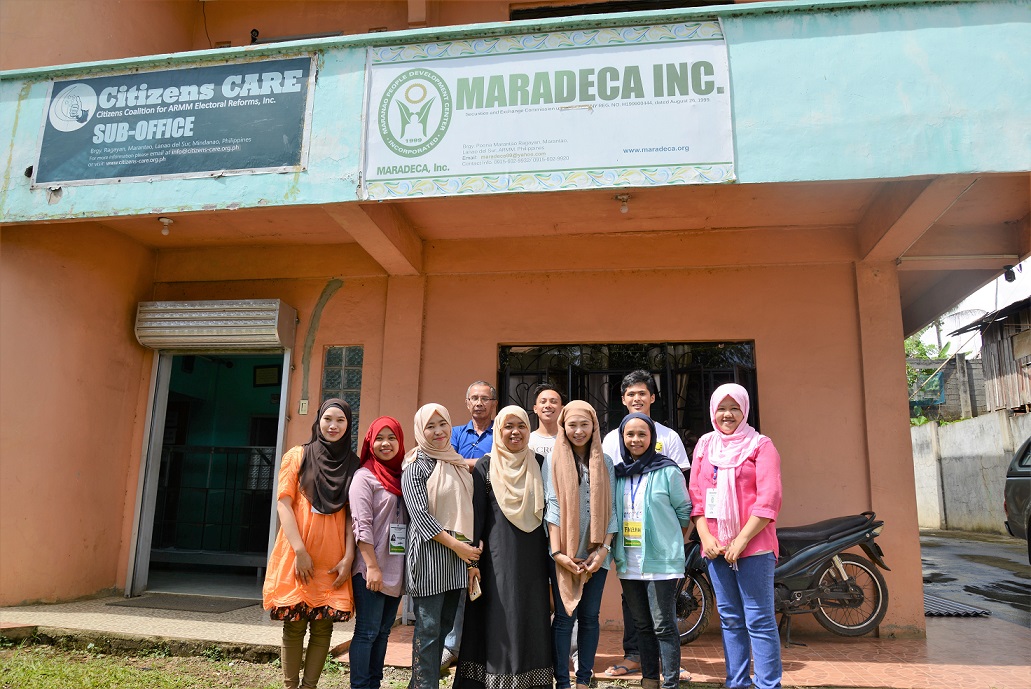
MARADECA resumes operations in Marantao
Among those who were displaced is the Maranao People Development Center (MARADECA). The organization has been operational in Lanao del Sur since 1999, assisting people in social economic advancement through peacebuilding, health, sanitation, education and development initiatives. MARADECA has been working closely with rural and urban communities in Marawi city and Lanao del Sur primarily focused on assisting women and children of displaced communities. They operate from an office located in Ragayan in Marantao – one of the areas affected by the conflict.
On 23 May, when fighting broke out in Marawi city, they were holding a meeting with partner Catholic Relief Services (CRS) at their office. About half of the staff members were in the office that day. Fighting started in Basak Malutlut, with members of the nonstate armed organization Maute Group exchanging gunfire with the military. As fighting continued, Faradika Salik, a project officer, was worried about how best to escort their visiting colleagues out of the city. Dressed in a hijab, she managed to get the CRS staff to safety through Saguiaran to Iligan. “I was also worried for the safety of our staff and those who were out in the field” say Farida. Her surname was the same as that of local politicians implicated in the conflict. “I had to present my birth certificate at every check point to prove I was not related to him.”
Amiladin Imam, 25, is a MARADECA field officer and was in Saguiaran when fighting broke out. On his way to work, he was stopped by the military in parts of the city. Fearing for the safety of his family, he requested permission from his office to gather wife and children, who were still in school. Access to the school was difficult as fighting escalated. He was also worried about getting his grandmother, whose house is near the market area, from Datu Dansalan. The next day, his relatives managed to reach his Grandmother and took the family by canoe through Lake Lanao to Masio. “I never thought the fighting would spread in the city,” says Imam.
MARADECA opened an office in Iligan and accounted for all their staff. They reorganized their operations and assisted in the data-gathering of IDPs as they continued to seek refuge in Iligan. Working in partnership with CRS and Plan International, they are assisting both home-based IDPs (in Piagapo, Marantao and Saguiran) and those in evacuation centres, building partitions and child-friendly spaces. They are also constructing women-friendly spaces in the same municipalities. MARADECA partnered with Plan International to construct bathing cubicles, washing areas and latrines in these locations. Juhairas Mai, 23, is helping MARADECA implement a profiling for beneficiaries in Kapatagan, Balabagan, Budipusoi, Wao and Bunburan.
Most of them operated from their hotels and rented houses. Some of the staff went as far as Tubod, about 50 kilometres from Iligan, to rent a place.
MARADECA reopened their office in Marawi on 27 November 2017. “We appreciate the assistance of the humanitarian community, and the Mindanao Humanitarian Team for assisting the Government to address the immediate needs of IDPs,” says Farida. “The challenges of return and resettlement of the displaced community are enormous. Our hope is that peace and reconciliation will prevail in Marawi.”
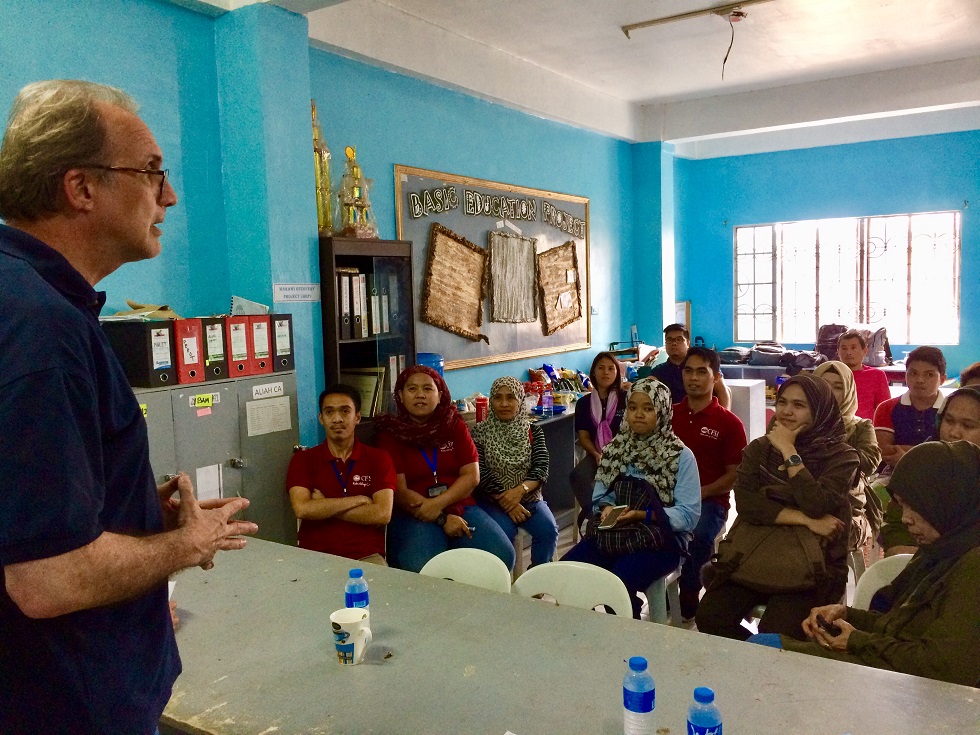
Marawi City, Lanao del Sur (3 December 2017) - CFSI Executive Director Steven Muncy addresses the staff during the reopening of its field office.
CFSI continues emergency response as it launches early recovery efforts
Community and Family Services International (CFSI) began its work in the conflict-affected areas of Mindanao in May 2000. The CFSI Operations Center was established in Cotabato City that same year. The CFSI Sub-Office in Iligan City, as well as the CFSI Field Office in Marawi City, were established in February 2009 in support of CFSI's expanding operations in Northern Mindanao, including, but not limited to its emergency response to an outbreak of armed conflict owing to the failure of the Memorandum of Agreement on Ancestral Domain. This included the displacement of roughly 750,000 people. CFSI's operations from the Marawi and Iligan Offices, beginning in 2009 and running for various periods of time, included emergency relief (protection, food assistance), reconstruction and development activities in support of the peace process, and development activities.
On 24 May, Marawi-based CFSI staff evacuated to the Sub-Office in Iligan City, rapidly seeking temporary housing in Iligan and nearby municipalities. The CFSI response to the rapidly deteriorating situation began on 25 May, with P250,000 (US$4,900) allocated from the CFSI Emergency Response Fund on 25 May and available at field level by 26 May. Within days, CFSI had entered into a rental agreement for a staff house in Iligan City, thereby providing a refuge for both displaced staff members and newly deployed staff members.
The CFSI Field Office in Marawi City officially reopened on 3 December, after many prior visits to various parts of Marawi City by CFSI staff for the purposes of assessment, relief distribution, and coordination activities. “Colleagues helped each other work through the various emotions associated with the losses, damages, and implications of the situation of Marawi City and also spent a lot of time helping others do the same,” said Steven Muncy, CFSI's Executive Director. “Most CFSI colleagues, particularly those from Northern but also Central Mindanao, have consistently reflected a deep devotion to, and concern for, Marawi City, in part because they are life-long residents of the city and surrounding area or went to school at Mindanao State University in Marawi City and, in part, because CFSI has deep ties to the city and the people of the Lanao provinces after so many years of work in the area.”
CFSI has begun ramping up its operations, launching its early recovery efforts even as its emergency response operations continue. CFSI's multi-year Marawi Recovery Project, funded by the Australian government, includes three project components: protection, psychosocial support, and livelihood. The latter include two sub-components, livelihood for urban-based activity by families in Marawi City and agricultural inputs for farming families in three affected municipalities in Lanao del Sur. The Food and Agriculture Organization of the United Nations will carry out the work with farming families, in cooperation with government partners and CFSI.
“The challenges of return and resettlement of the displaced community are enormous. Our hope is that peace and reconciliation will prevail in Marawi.” - Farida Salik, MARADECA Project Officer
CFSI's multi-year Marawi Recovery Project, funded by the Australian government, includes three project components: protection, psychosocial support, and livelihood with the latter included two subcomponents, livelihood for urban-based activity by families in Marawi City and agricultural inputs for farming families in three affected municipalities in Lanao del Sur.
Gender in Humanitarian Action training for Marawi humanitarian actors
During a humanitarian crisis, women, men, boys, girls, lesbian, gay, bisexual and transgender community have distinct needs, priorities and capacities. Emergencies can often deepen existing gender inequalities and heighten the risk of sexual and gender-based violence. The protracted situation in Marawi has left displaced communities vulnerable, with limited access to services that can assist them with their specific needs.
To support efforts in gender equality programming in emergencies, close to 80 humanitarian actors working in the Marawi response received training in Gender in Humanitarian Action in November and December. Facilitated by OCHA Philippines, participants included humanitarian actors from UN agencies, international and national NGOs, civil society organizations, and government partners.
The two-day gender training provided participants a platform to increase their awareness on the importance of gender equality programming in humanitarian action and to enhance accountability in recognizing cross-cutting gender issues. Among the themes in the programme were international and local humanitarian legal framework, humanitarian architecture and coordination, communication, culture, gender analysis and sex and age disaggregated data. Local and international gender markers and sessions on protection against sexual exploitation and abuse, and the new gender based violence guidelines were also included.
Noralyn, a participant from the Autonomous Region in Muslim Mindanao's Humanitarian Emergency Assistance and Response Team said, “In the 19 years that I have worked in gender and development, it's only now that I had the opportunity for this kind of training. It has deepened my understanding of gender issues”.
Efforts have been made by the Government of the Philipppines to address genderrelated concerns of those displaced by the Marawi conflict. In July, the Philippine Commission on Women released ‘Guidelines on the Use of the Gender and Development Budget to Address Gender-Related Concerns and Needs in the Recovery, Reconstruction, and Rehabilitation of the City of Marawi and Other Affected Localities’. The memorandum guides government agencies to ensure that humanitarian response is gender-sensitive, as mandated by Republic Act no. 9710, known as the Magna Carta for Women, and Republic Act no. 10121, or the Disaster Risk Reduction and Management Act. Government agencies under the Housing and Urban Development Coordinating Council were told to allocate their gender and development funds towards the needs of women and children displaced by Marawi.
The United Nations Population Fund (UNFPA) has been working together with local and government partners in Marawi, creating women and child friendly spaces in partnership with the Department of Social Welfare and Development, which offer protection and care to those at risk of gender-based violence. In addition to distributing dignity kits to women and new mothers, they also introduced the referral pathway for child protection and gender-based violence cases, together with the Joint Regional Child Protection- Gender-based Violence Working Group for the Marawi Armed Conflict Humanitarian Response. Cluster partners are supporting the government’s referral mechanism to address grave child rights violation, gender-based violence, as well as initatives for psychosocial support services.
Task Force Bangon Marawi and international partners have also organized a workshop on gender mainstreaming strategies and guidelines for the Bangon Marawi Rehabilitation and Reconstruction Plan on 12 to 14 December with participation of government agencies, NGOs and UN agencies. Training in Gender in Humanitarian Action facilitated by OCHA will continue in the Autonomous Region of Muslim Mindanao and Marawi local government in early 2018.
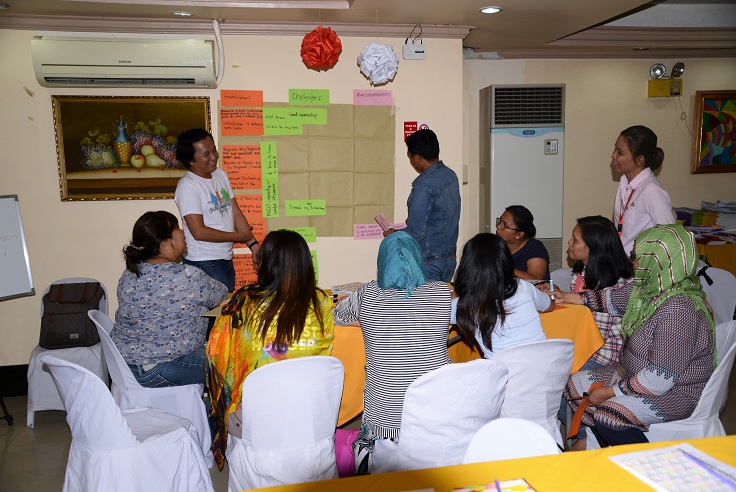
Cluster partners are supporting the government’s referral mechanism to address grave child rights violation, genderbased violence, as well as initatives for psychosocial support services.